Gastric Cancer Market Research, 2031
The global gastric cancer market size was valued at $2.1 billion in 2021, and is projected to reach $10.7 billion by 2031, growing at a CAGR of 17.9% from 2022 to 2031. Gastric cancer, also known as stomach cancer, is a type of cancer that begins in the cells lining of the stomach. Symptoms of gastric cancer can include abdominal pain, bloating, nausea, vomiting, and weight loss. Treatment for gastric cancer may include surgery, chemotherapy, radiation therapy, or a combination of these treatments.
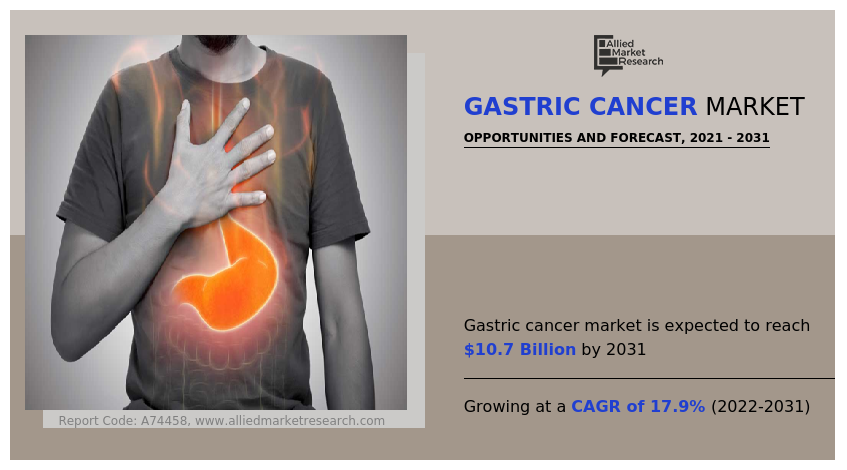
The increase in the occurrence of gastric cancer across the globe is projected to drive the gastric cancer market expansion. Moreover, the rising incidence of gastric cancer is expected to continue in the upcoming years and this trend is driving demand for effective treatments. The sedentary lifestyle and irregular food habits are leading to fatal diseases like cancer. Other risk factors such as an increase in obesity along with the surge in consumption of highly processed foods, sugary beverages, smoking, genetic modification in genes, family history with cancer, and alcohol have increased the causes of stomach cancer. As the incidence of these risk factors increases, the number of cases of gastric cancer is also expected to rise, which in turn drives the demand for effective treatments and therapies.
There are several tests involved in the treatment like diagnosis and staging, surgery, and radiation therapy. The diagnosis and staging of gastric cancer often involve a range of tests and procedures, including imaging tests, endoscopy, biopsies, and blood tests. These tests can be expensive and may require multiple visits to healthcare providers. The high cost of treatment for gastric cancer is a significant factor expected to restrain the gastric cancer market growth during the forecast period.
As people become more aware of the risk factors associated with gastric cancer, such as diet, tobacco use, and family history, they are more likely to seek medical attention and get screened for the disease. Early detection of gastric cancer is crucial for successful treatment and improved patient outcomes, and with greater awareness, more cases can be detected at an earlier stage. This in turn is predicted to increase the demand for diagnostic and treatment options, including drugs, surgery, and radiation therapy. With the increase in healthcare awareness, there is a growing gastric cancer market opportunity players in the future.
Gastric Cancer Market Segmentation
The gastric cancer market is segmented on the basis of disease type, treatment type, drug class outlook, route of administration, distribution channel, and region. By disease type, the market is divided into adenocarcinoma, lymphoma, gastrointestinal stromal tumor, carcinoid tumor, and others. By treatment type, it is divided into immunotherapy, targeted therapy, chemotherapy, radiation therapy, and surgery. By drug class outlook, it is divided into PD-1/PD-L1 inhibitors, HER2 antagonists, VEGFR2 antagonists, and others. By route of administration, it is divided into oral and injectable. By distribution channel, it is divided into hospital pharmacies, specialty & retail pharmacies, and others. By region, the market is analyzed across North America, Europe, Asia-Pacific, and LAMEA.
By Disease Type
By disease type, the adenocarcinoma segment dominated the market in 2021. Adenocarcinoma is a type of cancer that starts in mucus-producing (glandular) cells. Many organs have these types of cells and adenocarcinoma can develop in any of these organs. There is an increase in prevalence of gastric adenocarcinoma and rapid adoption of targeted therapy and immuno-checkpoint inhibitors for the treatment of gastric adenocarcinoma. Potential pipeline candidates and the growing trend of research collaborations are expected to favor the expansion of the segment. All these factors are anticipated to drive the growth of the adenocarcinoma segment during the gastric cancer market forecast period.
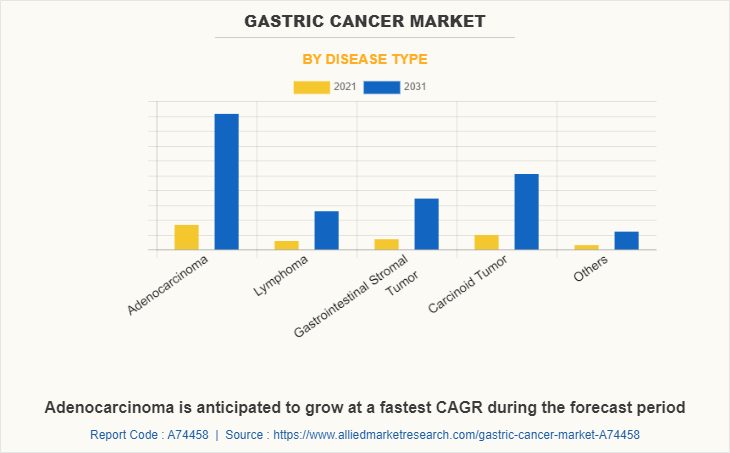
By Treatment Type
By treatment type, the chemotherapy segment dominated the market in 2021. Chemotherapy is a systemic treatment that uses drugs to destroy cancer cells throughout the body. Chemotherapy can be used to target cancer cells that have spread beyond the stomach or to shrink the tumor before surgery and to alleviate symptoms in advanced cases of gastric cancer. In addition to that targeted therapy used in gastric cancer, it is the overexpression or abnormal activation of certain molecular targets. The use of targeted therapy in gastric cancer is a rapidly evolving field, and the optimal treatment strategy may vary depending on the molecular characteristics of the tumor, the stage of cancer, and other individual factors. These are predicted to be the major factors driving the gastric cancer market size during the forecast period.
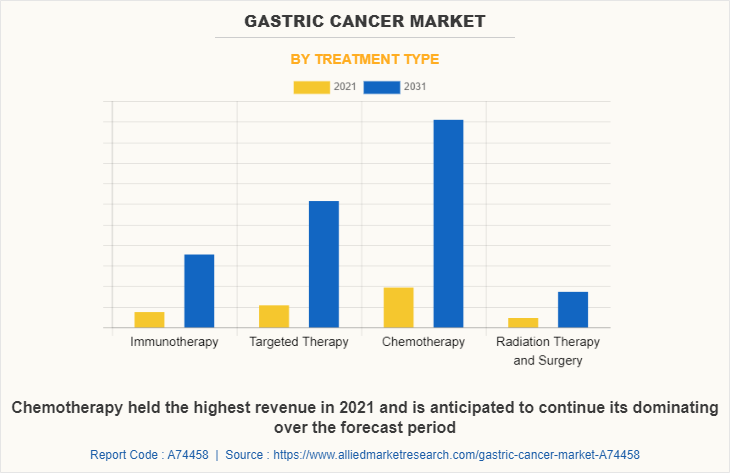
By Drug Class Outlook
By drug class outlook, the PD-1/PD-L1 inhibitors segment dominated the market in 2021. The programmed cell death protein 1 (PD-1) and its ligand PD-L1 are immune checkpoint proteins that normally help to prevent excessive immune responses that can damage healthy tissues. Several PD-1/PD-L1 inhibitors have been approved for the treatment of advanced or metastatic gastric cancer, including pembrolizumab, nivolumab, and atezolizumab. These drugs have shown efficacy in improving survival and reducing tumor progression in patients with advanced gastric cancer. PD-1/PD-L1 inhibitors in gastric cancer have the potential to enhance the immune response against cancer cells and the ability to target a specific molecular mechanism involved in tumor evasion. These are predicted to be the major factors driving the segment growth during the forecast period.
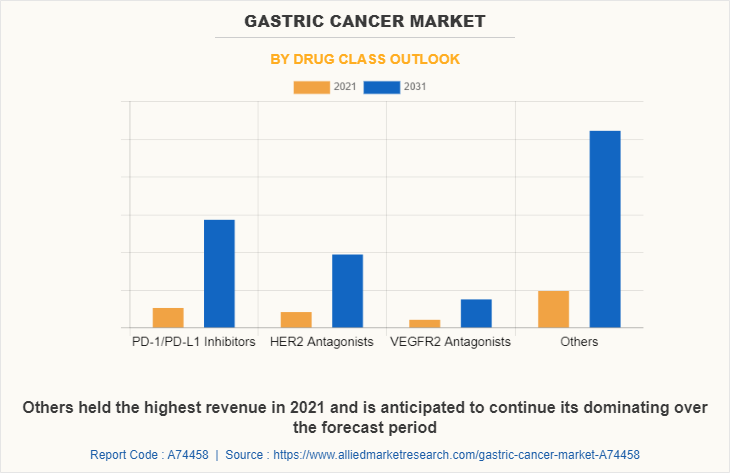
By Route of Administration
By route of administration, the oral segment dominated the global gastric cancer market share in 2021. Several companies are developing oral chemotherapy agents for treatment in order to avoid the time-consuming IV administration. Ascelia Pharma, for example, is currently conducting Phase II clinical trials with Oncoral (oral irinotecan) for the treatment of gastric cancer. All these factors anticipated the growth of the oral segment in the gastric cancer industry.
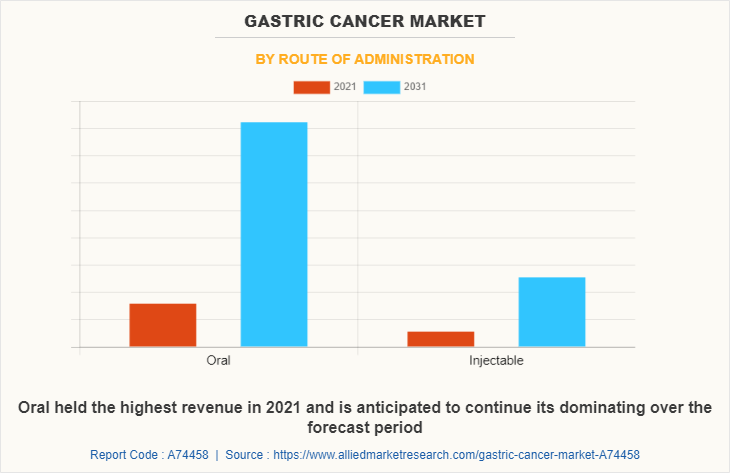
By Distribution Channel
By distribution channel, the specialty & retail pharmacies segment dominated the global gastric cancer market share in 2021. Specialty and retail pharmacies play an important role in the management of gastric cancer by providing patients with access to medications, supporting adherence to treatment, and offering specialized services and resources. In addition to that, specialty and retail pharmacies provide services such as the availability of over-the-counter and prescription medications, patient convenience, and the potential for improved treatment outcomes. All these factors anticipated the growth of the specialty & retail pharmacies segment during the forecast period.
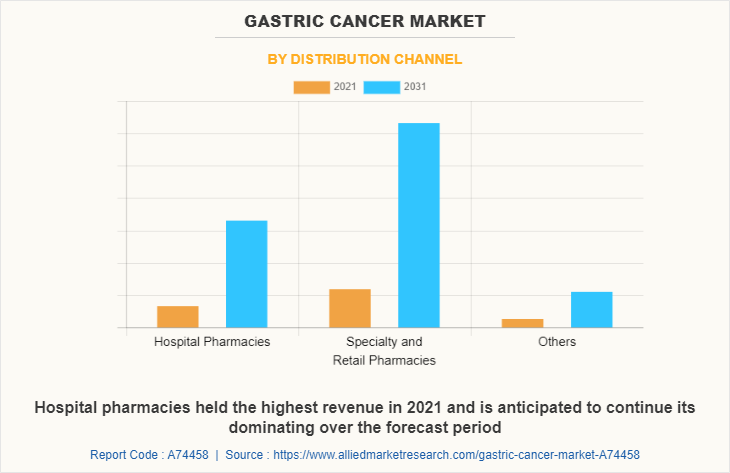
By Region
By region, Europe dominated the global market in 2021 and is projected to remain the fastest-growing region during the forecast period. As the population ages, the risk of developing gastric cancer increases. This is because the incidence of gastric cancer is highest in people over the age of 50, and the proportion of senior adults in the European population is increasing. In addition to that, lifestyle factors such as improper diet and smoking cause gastric cancer. Diets high in salt, smoked or pickled foods, and low in fruits and vegetables have been linked to an increase in risk of gastric cancer. Similarly, smoking is a most common risk factor for gastric cancer and the prevalence of smoking in many countries in Europe remains high. All these factors are anticipated to boost the growth of the Europe gastric cancer market during the forecast period.
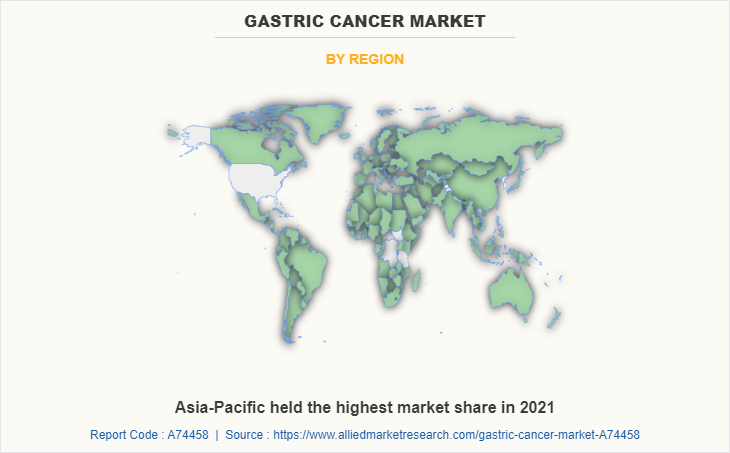
Competition Analysis
The key players profiled in this report include Novartis AG, Pfizer, Inc., Mylan N.V., F. Hoffmann La Roche Ltd., Eli Lilly and Company, Merck & Co., Inc., Teva Pharmaceutical Industries Ltd., Celltrion Healthcare Co., Ltd., Samsung Bioepis, and Bristol Myers Squibb Company.
Impact of COVID-19 on the Global Gastric Cancer Industry
- The COVID-19 pandemic had a significant impact on healthcare systems worldwide, including the diagnosis and treatment of cancer. The pandemic also resulted delays in diagnosis and treatment, changes in treatment protocols, and disruptions to cancer research.
- The main impact of the COVID-19 pandemic on gastric cancer has been delays in diagnosis and treatment. Many hospitals and clinics had to postpone or cancel non-urgent procedures and appointments to reduce the risk of COVID-19 transmission. This resulted in delays in cancer diagnosis and treatment, which can have a significant impact on patient outcomes.
- The pandemic had also disrupted cancer research, including clinical trials investigating new treatments for gastric cancer. Many clinical trials have been delayed or suspended due to COVID-19 restrictions, which may slow down the development of new treatments for the disease.
Key Benefits For Stakeholders
- This report provides a quantitative analysis of the market segments, current trends, estimations, and dynamics of the gastric cancer market analysis from 2021 to 2031 to identify the prevailing gastric cancer market opportunities.
- The market research is offered along with information related to key drivers, restraints, and opportunities.
- Porter's five forces analysis highlights the potency of buyers and suppliers to enable stakeholders make profit-oriented business decisions and strengthen their supplier-buyer network.
- In-depth analysis of the gastric cancer market segmentation assists to determine the prevailing market opportunities.
- Major countries in each region are mapped according to their revenue contribution to the global market.
- Market player positioning facilitates benchmarking and provides a clear understanding of the present position of the market players.
- The report includes the analysis of the regional as well as global gastric cancer market trends, key players, market segments, application areas, and market growth strategies.
Gastric Cancer Market Report Highlights
| Aspects | Details |
| Market Size By 2031 | USD 10.7 billion |
| Growth Rate | CAGR of 17.9% |
| Forecast period | 2021 - 2031 |
| Report Pages | 350 |
| By Disease Type |
|
| By Treatment Type |
|
| By Drug Class Outlook |
|
| By Route of Administration |
|
| By Distribution Channel |
|
| By Region |
|
| Key Market Players | samsung bioepis, Eli Lilly And Company, Teva Pharmaceutical Industries Ltd., Merck & Co., Inc., Novartis AG, F. Hoffmann La Roche Ltd., Mylan N.V., Pfizer, Inc., Celltrion Healthcare Co., Ltd., Bristol Myers Squibb Company |
Analyst Review
An increase in genetic mutations and conditions, such as hereditary diffuse gastric cancer and Lynch syndrome, can increase the risk of developing gastric cancer, which is the key factor projected to drive the growth of the gastric cancer market during the forecast period. However, difficulty in diagnosing the disease in its early stage and a lack of trained professionals are expected to limit the global gastric cancer market growth during the forecast period. In addition, the huge expenditure on the gastric cancer treatment methods is also projected to hamper the market growth. There are ongoing development activities on new treatment options, such as immunotherapy and targeted therapies. These treatments can be more effective and have fewer side effects than traditional chemotherapy, particularly for patients with advanced or metastatic disease. All these factors are anticipated to create opportunities for key players operating in the gastric cancer market during the forecast period.
Among the analyzed regions, Europe is anticipated to show the fastest market growth by 2031, followed by Asia-Pacific, North America, and LAMEA. Diets high in salt, smoked, or pickled foods, and low in fruits and vegetables have been linked to an increase in risk of gastric cancer. Similarly, smoking is a well-known risk factor for gastric cancer, and the prevalence of smoking in Europe remains high. These are the key factors responsible for the leading position of Europe and Asia-Pacific in the global gastric cancer market.
Gastric cancer is the fifth most common cancer worldwide, and its incidence is increasing rapidly, which is expected to drive the market growth. The rise in number of cases of gastric cancer is estimated to generate excellent opportunities in the gastric cancer market.
The major growth strategies adopted by gastric cancer market players are investment and agreement.
Europe will provide more business opportunities for the global gastric cancer market in the future.
Novartis AG, Pfizer, Inc., Mylan N.V., F. Hoffmann La Roche Ltd., Eli Lilly and Company, Merck & Co., Inc., Teva Pharmaceutical Industries Ltd., Celltrion Healthcare Co., Ltd., Samsung Bioepis, and Bristol Myers Squibb Company are the major players in the gastric cancer market.
The specialty & retail pharmacies sub-segment of the distribution channel acquired the maximum share of the global gastric cancer market in 2021.
Targeted therapy and chemotherapy are the major customers in the global gastric cancer market.
The report provides an extensive qualitative and quantitative analysis of the current trends and future estimations of the global gastric cancer market from 2021 to 2031 to determine the prevailing opportunities.
The development of advanced diagnostic and treatment options, such as endoscopic ultrasound, laparoscopic surgery, and targeted therapies, is anticipated to boost the gastric cancer market growth in the upcoming years.
Loading Table Of Content...
Loading Research Methodology...


